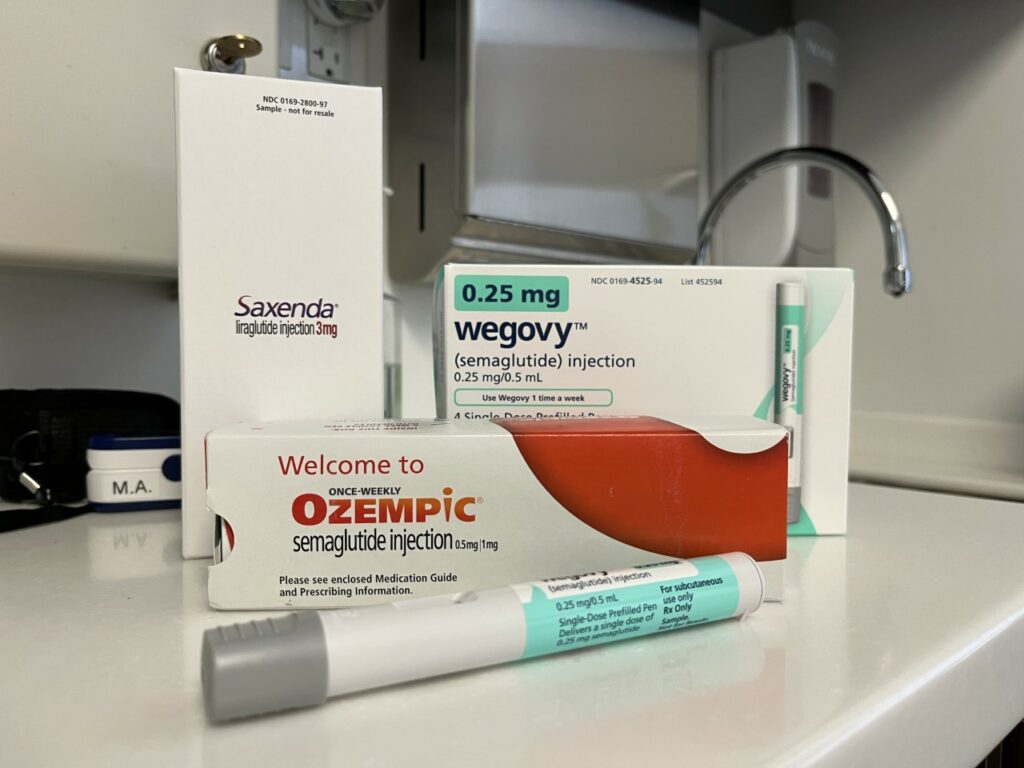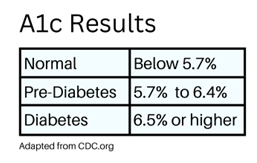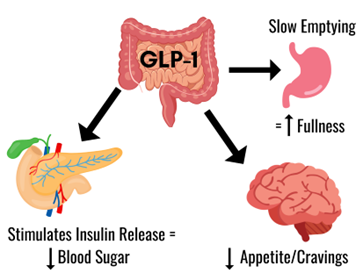Ozempic, Wegovy, Saxenda: Do new weight loss medications really work?
Posted by: Men's Health Boston in Men's Health on February 13, 2023
“Oh! Oh! Oh! Oooh-zeeemmmmpic!”

If you haven’t been living under a rock for the past 6 months, there’s a good chance you’ve heard the advertisements. From TV to TikTok, Ozempic and its sibling medications Wegovy and Saxenda (referred to collectively as GLP-1 receptor agonists) have stormed onto the public scene.
Here at Men’s Health Boston, we’re frequently approached by patients who have heard about these “miracle cures” for weight loss, and who want to know: do they actually work?
Today, we want to dive deeply into some of the most common questions we get asked by patients, in order to separate the science from the science fiction.
If you’re considering treatment with a GLP-1 agonist, today’s blog is no substitute for a personal conversation with your healthcare provider. But if you’re trying to wrap your head around what these drugs are, how they work, and what the risks versus rewards look like, we think it’s a pretty good place to start.
#1: Do weight loss medications actually work?
Yes, they do – and not just for weight loss, although the data on that is quite good. Ozempic, Wegovy, and Saxenda have all three proven themselves effective in lowering blood sugar and reducing appetite/cravings in multiple research studies dating back to 2013.

- 60% of Saxenda patients lost greater than or equal to 12 lbs, with 1 out of 3 patients losing an average of 23 lbs.
- In the initial research trials, Saxenda was shown to normalize blood sugar levels in some pre-diabetic subjects.
- In one large trial, Ozempic users lost an average of 14 lbs from their baseline weight over 10 months.
- In addition, Ozempic is approved specifically to treat Type 2 Diabetes and has shown the potential to lower Hemoglobin A1c by more than 2%.
- 83.5% of Wegovy patients lost greater than or equal to 12 lbs, with 2 out of 3 patients losing an average of 23 lbs, and 30% losing more than 45 lbs.
- Recently,a study published in June 2022showed that treatment with Wegovy reduced the 10-year-risk of developing diabetes by around 60%.
#2: How do these medications work? Why do people lose weight?
Glucagon-like peptide-1 (GLP-1) is a major hormone secreted by the intestines. Its job is to help regulate the speed with which food leaves the stomach and to prepare the body to absorb and store nutrients. Normally, when you eat, GLP-1 is released naturally and has the following actions:

- Signals the stomach to release food slowly
- Stimulates the pancreas to stop releasing glucagon, and start releasing insulin to prepare for a spike in blood sugar
- (Eventually) travels to the brain and acts on several areas involved in appetite regulation, shutting down the desire for food
These are powerful effects, but they are tempered by the fact that GLP-1 doesn’t stick around for very long. It’s broken down quickly by the body after release.
GLP-1 receptor agonist medications, on the other hand, take advantage of these powerful effects more consistently. They are designed to be almost identical to naturally occurring GLP-1 hormone, activating the very same receptors in the body. Small tweaks to the molecular structures allow the medications to avoid breakdown and exert their effects for longer periods of time.
This is why some of the medications can be dosed just once weekly, and why patients benefit from the consistent blood-sugar-lowering and appetite-suppressing effects. While research is still ongoing, one popular hypothesis is that GLP-1 agonists cause weight loss primarily because patients who are less hungry eat fewer calories – consistently.
#3: What’s the difference between Saxenda, Ozempic, and Wegovy? Why is Ozempic so popular?
Understanding the difference between these medications can be a little confusing, so we built the table below to help map things out.
| Medication Name | Generic Name | FDA-Approved For? | Frequency of Dose | Max Dose |
| Victoza | Liraglutide | Type 2 Diabetes only | Once Daily | 1.8mg |
| Saxenda | Liraglutide | Weight Loss only | Once Daily | 3.0 mg |
| Trulicity | Dulaglutide | Type 2 Diabetes only | Once Weekley | 4.5 mg |
| Ozempic | Semaglutide | Type 2 Diabetes only | Once Weekly | 1 or 2 mg |
| Wegovy | Semaglutide | Weight Loss only | Once Weekly | 2.4 mg |
| (New) Mounjaro | Tirzepatide | Type 2 Diabetes only | Once Weekly | 15 mg |
You might notice that Ozempic and Wegovy look strikingly similar above. There is a reason for this: for all intents and purposes, Ozempic and Wegovy are the same medication, administered in slightly different doses.
An important point in the history of GLP-1 drugs is that every medication in this class so far has started out as a drug to treat diabetes, because of the blood sugar management effects. It was only during the clinical trials for FDA approval that researchers and drug designers realized that patients were simultaneously losing weight – in some cases, a lot of it. This led drug makers to reapply for FDA approval of the compounds specifically for weight loss, under different brand names and at slightly higher doses.
#4: Can I use this to “jumpstart” my weight loss?
This is the number one question we get asked, so it’s important to be clear here: all of the GLP-1 agonist medications are intended for long-term, continuous use similar to medications used to manage other heart disease risk factors like hypertension or high cholesterol.
We recognize this isn’t what patients want to hear. But it is an important consideration, given that the research published so far shows that when patients discontinue using these medications, their appetite returns, and the majority regain some or all of the weight they initially lost.
At MHB, we never say “forever” when it comes to medications. Instead, we say “as long as it makes sense” and engage in shared decision-making with our patients about what that means for them. We also provide robust nutrition and lifestyle support geared towards making long-term, sustainable changes more likely to keep the positive health benefits intact.
#5: Can you stop taking these medications once you start? What if you switch insurance plans and lose coverage?
GLP-1 medications are safe to discontinue – but in most cases, it isn’t an ideal option. Obesity is a chronic disease, which means that losing weight isn’t as simple as “eat less, move more”. In most cases, weight loss causes internal hormonal shifts which work to decrease movement and increase hunger and appetite as the body tries to return to it’s previous set point weight.
When you’re on a GLP-1 medication like Wegovy, many of those internal signals are blocked. But for most people, going off the medication allows hunger and appetite to return, sometimes with a vengeance.
Unfortunately, not all insurers cover GLP-1 medications at this time. This can land folks who switch plans in a tight spot. While there is good reason to be hopeful that generic versions will be available in coming years, for now the out-of-pocket costs make long-term use inaccessible for most people. The potential reality of loss of coverage makes undergoing lifestyle counseling alongside medication use even more critical.
#6: Are there any side effects to these medications?
As noted in most testimonials, it’s true that the majority of patients experience some side effects to varying degrees. You can see a full list here, but in our experience, the most common complaints include:
- Nausea, occasionally leading to periods of vomiting
- Diarrhea and/or constipation
- Fatigue
- Bloating/gas
Because these medications require titration (i.e. increasing dose over time as your body adjusts), side effects generally start off mild and get worse in the short-term as the dose increases. In the majority of cases, this relieves after a few weeks on the maximum dose, and most patients choose to continue, feeling the benefits of the medications out-weight the negatives.
In the interim, we provide patients with education and personalized strategies to manage whatever side effects they experience.
#7: What about the thyroid cancer warning?
While GLP-1 receptor agonists do appear to be safe based on the currently available research, they aren’t indicated for use in everyone. The short list of disqualifications for these medications includes a personal or family history of two relatively rare conditions known as Medullary Thyroid Cancer (MTC) and Multiple Endocrine Neoplasia Type 2 (MEN-2). In both cases, the concern is over the development of a specific type of thyroid cancer involving the parafollicular cells (aka “C cells”) of the gland.
You can read a more in-depth explanation and analysis of risk from the Cleveland Clinic, but here’s the bottom line: Out of an abundance of caution, anyone with a personal or family history making them more susceptible to C cell thyroid cancer (specifically) is advised not to use a GLP-1 medication. For everyone else, the risk of harm is thought to be very low.
#8: I’m interested in weight loss medications. What is my next step?
Obesity is increasingly being recognized as a chronic disease, and more effective therapies are becoming available.
If you are concerned about your weight and have associated health risk factors, we can help. For a clinical evaluation with one of our expert providers, call our office or request an appointment today. We support all patients interested in weight loss with comprehensive medical and lifestyle programs and can help you determine whether your insurance will cover these medications.

